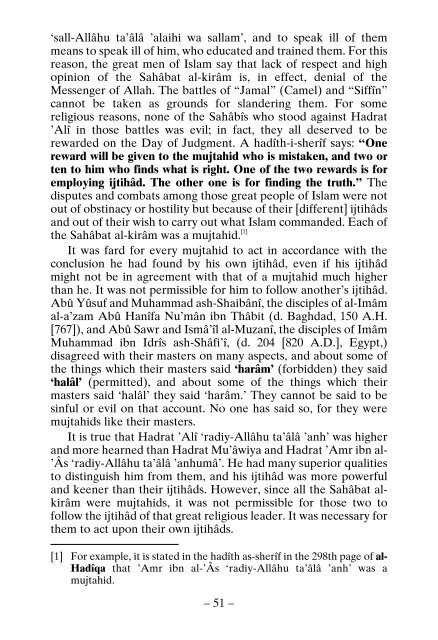Belief and Islam
BELIEF AND ISLAM star This work, Belief and Islam, originally was written in Persian under the title I’tiqâd-nâma by Hadrât Mawlânâ Khâlid al-Baghdâdî, a profound ‘âlim of Islam and a specialist in ma’ârif of tasawwuf. Hâji Faydullah Effendi of Kemah, a khalîfa of great walî Mavlânâ Mahmûd Sâhib, the brother of the author, translated the book into Turkish and named it Farâid-ul-fawâid which was printed in Istanbul in 1312 A.H.[1894]. Our bookstore had it translated again from the Persian original into Turkish and, some explanations and three chapters, published it with the title Imân ve Islâm in 1966. German, French and Arabic versions are also published by our bookstore. This book, explains five fundamentals of Islam, six fundamentals of îmân and the contemporary information about the matter and refutes those who are against Islam and those who are lâ-madbhabî.
BELIEF AND ISLAM
star This work, Belief and Islam, originally was written in Persian under the title I’tiqâd-nâma by Hadrât Mawlânâ Khâlid al-Baghdâdî, a profound ‘âlim of Islam and a specialist in ma’ârif of tasawwuf. Hâji Faydullah Effendi of Kemah, a khalîfa of great walî Mavlânâ Mahmûd Sâhib, the brother of the author, translated the book into Turkish and named it Farâid-ul-fawâid which was printed in Istanbul in 1312 A.H.[1894]. Our bookstore had it translated again from the Persian original into Turkish and, some explanations and three chapters, published it with the title Imân ve Islâm in 1966. German, French and Arabic versions are also published by our bookstore. This book, explains five fundamentals of Islam, six fundamentals of îmân and the contemporary information about the matter and refutes those who are against Islam and those who are lâ-madbhabî.
Create successful ePaper yourself
Turn your PDF publications into a flip-book with our unique Google optimized e-Paper software.
‘sall-Allâhu ta’âlâ ’alaihi wa sallam’, <strong>and</strong> to speak ill of them<br />
means to speak ill of him, who educated <strong>and</strong> trained them. For this<br />
reason, the great men of <strong>Islam</strong> say that lack of respect <strong>and</strong> high<br />
opinion of the Sahâbat al-kirâm is, in effect, denial of the<br />
Messenger of Allah. The battles of “Jamal” (Camel) <strong>and</strong> “Siffîn”<br />
cannot be taken as grounds for sl<strong>and</strong>ering them. For some<br />
religious reasons, none of the Sahâbîs who stood against Hadrat<br />
’Alî in those battles was evil; in fact, they all deserved to be<br />
rewarded on the Day of Judgment. A hadîth-i-sherîf says: “One<br />
reward will be given to the mujtahid who is mistaken, <strong>and</strong> two or<br />
ten to him who finds what is right. One of the two rewards is for<br />
employing ijtihâd. The other one is for finding the truth.” The<br />
disputes <strong>and</strong> combats among those great people of <strong>Islam</strong> were not<br />
out of obstinacy or hostility but because of their [different] ijtihâds<br />
<strong>and</strong> out of their wish to carry out what <strong>Islam</strong> comm<strong>and</strong>ed. Each of<br />
the Sahâbat al-kirâm was a mujtahid. [1]<br />
It was fard for every mujtahid to act in accordance with the<br />
conclusion he had found by his own ijtihâd, even if his ijtihâd<br />
might not be in agreement with that of a mujtahid much higher<br />
than he. It was not permissible for him to follow another’s ijtihâd.<br />
Abû Yûsuf <strong>and</strong> Muhammad ash-Shaibânî, the disciples of al-Imâm<br />
al-a’zam Abû Hanîfa Nu’mân ibn Thâbit (d. Baghdad, 150 A.H.<br />
[767]), <strong>and</strong> Abû Sawr <strong>and</strong> Ismâ’îl al-Muzanî, the disciples of Imâm<br />
Muhammad ibn Idrîs ash-Shâfi’î, (d. 204 [820 A.D.], Egypt,)<br />
disagreed with their masters on many aspects, <strong>and</strong> about some of<br />
the things which their masters said ‘harâm’ (forbidden) they said<br />
‘halâl’ (permitted), <strong>and</strong> about some of the things which their<br />
masters said ‘halâl’ they said ‘harâm.’ They cannot be said to be<br />
sinful or evil on that account. No one has said so, for they were<br />
mujtahids like their masters.<br />
It is true that Hadrat ’Alî ‘radiy-Allâhu ta’âlâ ’anh’ was higher<br />
<strong>and</strong> more hearned than Hadrat Mu’âwiya <strong>and</strong> Hadrat ’Amr ibn al-<br />
’Âs ‘radiy-Allâhu ta’âlâ ’anhumâ’. He had many superior qualities<br />
to distinguish him from them, <strong>and</strong> his ijtihâd was more powerful<br />
<strong>and</strong> keener than their ijtihâds. However, since all the Sahâbat alkirâm<br />
were mujtahids, it was not permissible for those two to<br />
follow the ijtihâd of that great religious leader. It was necessary for<br />
them to act upon their own ijtihâds.<br />
[1] For example, it is stated in the hadîth as-sherîf in the 298th page of al-<br />
Hadîqa that ’Amr ibn al-’Âs ‘radiy-Allâhu ta’âlâ ’anh’ was a<br />
mujtahid.<br />
– 51 –

















